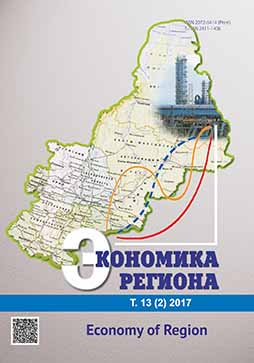Диагностика ожиданий экономических агентов как инструмент моделирования экономических циклов
Diagnostics of Expectations of Economic Agents as an Instrument for the Modelling of Economic Cycles
Author(s): Marat Rashitovich Safiullin, Leonid Alekseevich ELSHIN, Mariya Igorevna PRYGUNOVASubject(s): Economy
Published by: Институт экономики Уральского отделения Российской академии наук
Keywords: short-term cycles; forecasting; phase shifts; leading indicators; cycles of priority development; taxonomical method of modelling; development institution; structural shifts; expectations;
Summary/Abstract: The emerging trends of the development of are based on rapid institutional transformations and corresponding progressive forms of value added creation. Therefore, the analysis of these trends demand advanced and evidence-based approaches. Earlier, the processes of economic industrialization, implementation of large-scale solutions, high localization of economic processes were the priority directions for the development. Nowadays, the major proprieties are such strategic focus for the development as the formation and large-scale replication of the local low-concentrated growth points, diversification of business activity, and distribution of technological, institutional, product developments; development of the social parameters of economic growth including those based on the principles of environmental friendliness of business activities, etc. The complexity and multidimensionality of the processes of socio-economic development create a basis for the improvement of the traditional theoretical approaches to modeling and forecasting of economic growth and, respectively, of the cyclic development of the economy. The strengthening of globalization processes as well as the regionalization of the economy, formation of the complex and mobile dynamic structures generating the crisis phenomena make relevant the problem of the modern regulation of the cyclic development of the economy. Its solution is impossible with classical methods of the cyclist theory. The traditional approaches for the modeling of the cyclic development of the economy can lead to a decline in the quality of the predictive models constructed on the basis of extrapolation methods with the application of the scenario forecasts of market and institutional factors which are the drivers of the phase changes of a cycle. The above-mentioned means that the current development of the considered predictive models supposes a number of risks connected with the accuracy of prediction and anticipation of cyclic fluctuations. Therefore, there is a need of the scientific justification (verification) and approbation of the models of the cyclical fluctuations constructed on the basis of the factors, which would have both the high level of sensitivity to the changes in external and internal environment of the economic system, and the high level of the predictability of cyclic trends. The authors have theoretically substantiated and approved the model of cyclical fluctuations of the economy. It is based ojn the integrated cross-correlation indicator characterizing the expectations of economic agents.
Journal: Экономика региона
- Issue Year: 13/2017
- Issue No: 2
- Page Range: 604-615
- Page Count: 12
- Language: Russian

